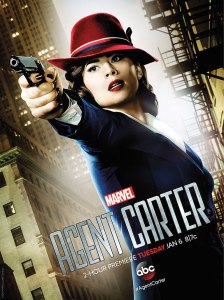A recent discussion about diversity on television prompted me to take a look at something I didn’t know much about: the history of African-Americans in Federal law enforcement. It all started with a conversation about the renewal of Agent Carter and a comment by veteran comics editor Rachel Edidin that it would be nice to see greater diversity in the series (of which she is a fan). I have not seen the show (which is not out in the UK), but the conversation this started raised some interesting points.
Some people on Twitter responded by saying that a US government agency in the 1940s would not be a place where you’d find a lot of minorities. Edidin replied by pointing out that in fact the first African-American FBI agent, James Wormley Jones, joined the Bureau in 1919 — by which point he’d already been a police officer in Washington, DC and an officer in the army.
So a) it isn’t necessarily implausible for there to be black agents in an intelligence agency and b) even if it were, Marvel has a long (if not always consistent or particularly well-managed) legacy of promoting inclusion. Take the original lineup of Sergeant Fury and His Howling Commandos, which included a black soldier, Gabriel Jones, even though the US military was not integrated during WWII (that is, there were many black soldiers, but they served in all-black units).

Anyway, James Wormley Jones. An interesting guy — but what I hadn’t seen mentioned in this discussion is what Jones did at the Bureau. After all, why did J. Edgar Hoover need black agents? He needed them to spy on “subversive” organisations campaigning for black rights — like Marcus Garvey’s Universal Negro Improvement Association (UNIA), which was Jones’s beat. I’m sure he did other things as well — after all, he was a regular cop in Washington, not some undercover red-hunter. But that’s the one that stands out the most.

So on the one hand, yes, there were African-American FBI agents early in the agency’s history. On the other hand, they were still at least partly agents of a racist agenda. On the other other hand, they present Hoover’s agenda in a more complex and interesting light, with lots of potential for character development and compelling story. But if you don’t want to do that — like, say, if you’re just a spy show about action and hijinks and stuff — you can’t hide behind “but they didn’t have black people back then.”
Which isn’t to say that every period of history in every part of the world looked like modern America, which some people sometimes assume it did. But this is modern America we’re talking about here. More or less.
Anyway, I thought Jones was an interesting guy and I was pleased that that discussion pointed me to him.
